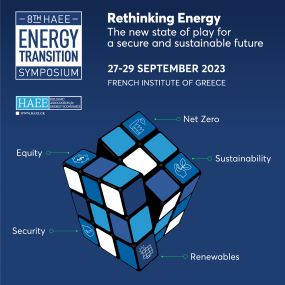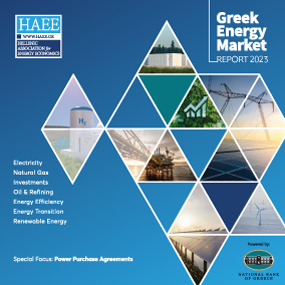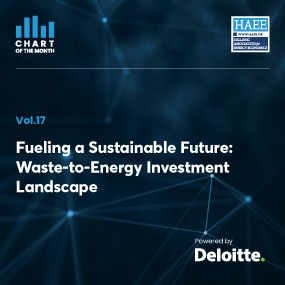
📢 Highlight
The Hellenic Association for Energy Economics is proud to announce the release of the 5th edition of the most anticipated annual energy report, the "Energy Bible", which is powered by the National Bank of Greece. HAEE's flagship publication includes the most updated statistical energy data, offering objective analysis and critical insights into the Greek and the European energy markets. It is, thus, an invaluable asset for energy professionals, investors, researchers, academics, policymakers, students, and all those interested in the energy world. This year's special focus was the potential of European and Greek PPA market. The 2023 Report is available exclusively to HAEE Members, prior to its official presentation during the 8th HAEE Energy Transition Symposium, scheduled to take place at the French Institute of Greece, from 27 to 29 September 2023. 👉 Please make sure to log in to your HAEE Account here and insert the password given to unlock and download the full Report. 👉 If you are not a HAEE Member yet, don't miss the chance to be part of our energy community and gain exclusive access to the Greek Energy Market Report 2023.
⚡ Energy Insights
Renewable Energy Country Attractiveness Index – RECAI 61st Edition Since 2003, the biannual RECAI has ranked the world's top 40 renewable energy investment and deployment markets according to their attractiveness. The rankings reflect EY’s evaluations of market attractiveness and international market trends. The RECAI 61st Edition explores the impact and influence of the Act on renewables investment activity across global markets and ranks Greece as 1st in the normalized index. World Energy Transitions Outlook 2023 1.5° C Pathway Within the timeframe of 2030, the goals of the sustainable development agenda must be accomplished while concurrently reducing emissions significantly. Energy is critical for reversing climate change and achieving sustainable development. The World Energy Transitions Outlook 2023 provides an overview of the progress made by monitoring implementation and gaps across all energy sectors. It demonstrates that most of the progress has been made to date in the energy sector, where a virtuous circle of technology, policy, and innovation has brought us a long way; however, the scale and scope of implementation fall far short of what is required to remain on the 1.5°C pathway. World Energy Investment 2023 Investments in renewable energy technologies are substantially outpacing expenditures on fossil fuels as affordability and security concerns spurred by the global energy crisis strengthen the momentum behind more sustainable options. The World Energy Investment 2023 report provides a global benchmark for monitoring capital flows in the energy sector and investigates how investors evaluate risks and opportunities in all areas of fuel and electricity supply, critical minerals, efficiency, research and development, and energy finance. Energy Technology Perspectives 2023 Global energy and technology supply channels have been severely disrupted by the Covid-19 pandemic and Russia's invasion of Ukraine. Rising energy and material costs, as well as shortages of critical minerals, semiconductors, and other components, pose potential obstacles to the energy transition. Energy Technology Perspectives 2023 report analyses the risks and opportunities associated with the development and scaling up of renewable energy and technology supply chains in the coming years, from the perspectives of energy security, resilience, and sustainability. Clean Ammonia in The Future Energy System Ammonia has long been a globally significant strategic commodity. While it has numerous applications in the chemical industry, refrigeration, mining, pharmaceuticals, etc., its production of synthetic nitrogen fertilizers is a key factor in global food security, supporting food production for approximately half of the world's population. The publication contains a techno-economic analysis of alternative and cleaner pathways for ammonia production, looking both at carbon capture technology and renewable energy-based electrolysis.
📰 Energy Market News
The lower price of natural gas, both in the TTF contract and in LNG cargoes, translated to a significant drop in the wholesale power price around Europe and therefore electricity bills for households and businesses. It is notable that TTF stands around 30-35 euro/MWh right now, which translates to a wholesale power price of about 100 euro/MWh for Greece and falls further under 100 euros in the days with high renewable production. It is worth saying, that the price of natural gas is passed on to the Greek power market after one month. This means that any rise of its price in the next few months will be felt in Greece one month later. Right now, it is not clear which factors could lead to a new rise of prices. However, the recent reaction of TTF to the unscheduled maintenance in certain Norwegian production fields (+15 euros/MWh) means that things are still tight in the market.
📘 In Review
In months May and June, HAEE's scientific team released two new issues of the Chart of the Month. Volumes 16 and 17 refer to "Paths to decarbonize energy-intensive industries: The case of CCUS" and "Fueling a Sustainable Future: Waste-to-Energy Investment Landscape" respectively, presenting the latest energy trends and offering a critical overview. Get access to both publications that are powered by Deloitte.
The prominent energy expert who trusted her opinion article with HAEE this period is Ms. Clara Poletti, Chairperson of ACER Board of Regulators & ARERA Commissioner. Ms. Poletti focuses on the concept of resilience and its implications in the power sector. Using the example of Italy, she analyses that increased Resilience Planning funding in the future could be an effective response to power risk management. You may find the full article below.
👨👦👦 Join us!
Register now and be part of our community to get access to a vast network of energy experts and professionals and to receive the latest and most accurate information on energy advances.
✨ Cherry-picked
|



